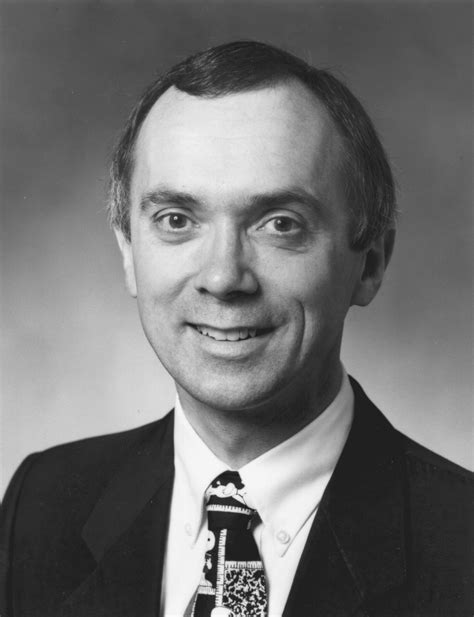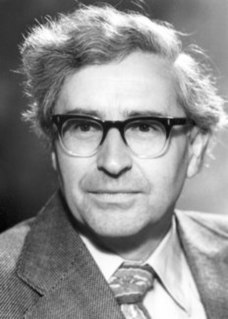A Quote by Stanley J. Grenz
Ultimately our claim to know the one God only gains credence in the contemporary world as he demonstrates the divine presence through the way we live- through our lives as we connect our Christian belief with true Christian living.
Related Quotes
Christian community is like the Christian's sanctification. It is a gift of God which we cannot claim. Only God knows the real state of our fellowship, of our sanctification. What may appear weak and trifling to us may be great and glorious to God. Just as the Christian should not be constantly feeling his spiritual pulse, so, too, the Christian community has not been given to us by God for us to be constantly taking its temperature.
I believe God loves the world through us - through you and through me. We use Mother Teresa's name; it is only a name, but we are real co-workers and carriers of His love. Today God loves the world through us. Especially in times like these when people are trying to make God "was," it is you and I, by our love, by the purity of our lives, by our compassion, who prove to the world that God "is."
Peace is not just the absence of war, it is the active presence of a capacity for love and compassion, and reciprocity. It is an awareness that our lives are not to be lived simply for ourselves through expressing our individuality, but we confirm the purpose of our lives through the work of expressing our shared sense of community in a purposeful and practical way; to sustain our own lives we sustain the lives of others - in family, in a community of neighborhoods called a city, and in a community of nations called the world.
You better believe that I want to build a Christian nation, because the only option is a pagan nation. Not that the government can make someone a Christian by decree. A Christian nation would be defined as We acknowledge God in our body politic, in our communities, that the God of the Bible is our God, and, we acknowledge that His law is supreme.
More than anything else, kindness is a way of life. It is a way of living and walking through life. It is a way of dealing with all that is-our selves, our bodies, our dreams and goals, our neighbors, our competitors, our enemies, our air, our earth, our animals, our space, our time, and our very consciousness. Do we treat all creation with kindness? Isn't all creation holy and divine?
The Bible is one long story of God meeting our rebellion with His rescue, our sin with His salvation, our guilt with His grace, our badness with His goodness. The overwhelming focus of the Bible is not the work of the redeemed but the work of the Redeemer. Which means that the Bible is not first a recipe for Christian living but a revelation book of Jesus who is the answer to our un-Christian living.
Ask me if Christianity (my version of it, yours, the Pope's, whoever's) is orthodox, meaning true, and here's my honest answer: a little, but not yet. Assuming by Christianity you mean the Christian understanding of the world and God, Christian opinions on soul, text, and culture I'd have to say that we probably have a couple of things right, but a lot of things wrong, and even more spreads before us unseen and unimagined. But at least our eyes are open! To be a Christian in a generously orthodox way is not to claim to have the truth captured, stuffed, and mounted on the wall.
Living an awakened life [...] is just a matter of where our attention is being placed. It is possible for our human-beingness and our true nature or presence to exist wonderfully well together, enriching each other through their closeness. It is through the power of our attention that we experience one or the other or both.
Christian faith is exclusivistic. Christian faith lays claim upon our lives. The sanctity of life, what we do with a life, is very definitive in the Christian faith, what we do with sexuality, what we do with marriage, all of the fundamental questions of life have points of reference for answers, and people just have an aversion for that. That I think is the biggest reason they feel hostile towards the Christian faith.
The ghostly presence of virtual particles defies rational common sense and is nonintuitive for those unacquainted with physics. Religious belief in God, and Christian belief that God became Man around two thousand years ago, may seem strange to common-sense thinking. But when the most elementary physical things behave in this way, we should be prepared to accept that the deepest aspects of our existence go beyond our common-sense intuitions.
Most Christians are more than content to live out their lives surrounded by the trappings of our world, rather than to risk losing them in becoming a radical Christian. A radical Christian (by my definition) is one who will put God first in all decisions, even when putting God first is costly. In the business world, this means putting God first even when doing so costs money. That is true freedom - spiritual freedom - as opposed to business bondage.
Apocalypse does not point to a fiery Armageddon but to the fact that our ignorance and our complacency are coming to an end. The exclusivism of there being only one way in which we can be saved, the idea that there is a single religious group that is in sole possession of the truth—that is the world as we know it that must pass away. What is the kingdom? It lies in our realization of the ubiquity of the divine presence in our neighbors, in our enemies, in all of us.
The Christian life is not just our own private affair. If we have been born again into God's family, not only has he become our Father but every other Christian believer in the world, whatever his nation or denomination, has become our brother or sister in Christ. But it is no good supposing that membership of the universal Church of Christ is enough; we must belong to some local branch of it. Every Christian's place is in a local church. sharing in its worship, its fellowship, and its witness.

































